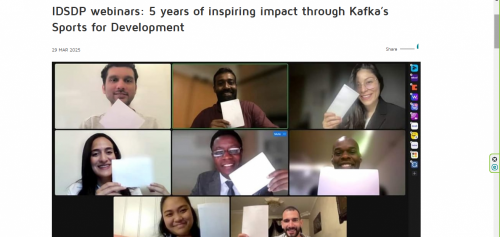
https://www.sportanddev.org/latest/news/idsdp-webinars-5-years-inspiring...
For the past five years, Kafka Welfare Organization has been at the forefront of promoting sports as a tool for social development and peace. Through its annual International Day of Sport for Development and Peace (IDSDP) webinars, Kafka has brought together global experts, athletes, researchers, and policymakers to discuss how sports can contribute to the Sustainable Development Goals (SDGs), gender equality, conflict resolution, and community building.
As we reflect on these five years (2020–2024), it is essential to analyze how these discussions have evolved, their impact, and what the future holds for sports as a driver of positive change.
The evolution of IDSDP webinars (2020–2024)
Each year, Kafka’s webinars have focused on different aspects of sports for development and peace, responding to global challenges and emerging needs.
2020: Sports & mental health in the COVID-19 era
The inaugural webinar took place during the height of the COVID-19 pandemic, emphasizing how sports and physical activity could support mental well-being. Experts highlighted how athletes and sports professionals could use their platforms to spread awareness and encourage virtual engagement.
2021: Gender equality and community building through sports
With a focus on South Asia, this edition examined the role of sports in fostering gender equality and empowering marginalized communities. Panelists emphasized the need for cultural shifts, localized sports development models, and policy-level changes to make sports more inclusive.
2022: Women’s empowerment & social development through sports
The discussion moved toward how sports can empower women and strengthen communities. Speakers stressed the importance of integrating sports into national development agendas, securing sustainable funding, and ensuring sports programs are evaluated for their impact.
2023: Sports and the Sustainable Development Goals (SDGs)
This edition highlighted the connection between sports and achieving the UN’s SDGs. The webinar examined how sports initiatives contribute to education, health, gender equality, and peacebuilding. Stakeholder collaboration and media engagement were identified as key factors for progress.
2024: Sports for peace & inclusion
The most recent webinar focused on how sports can serve as a catalyst for social cohesion, conflict resolution, and empowering vulnerable populations. Discussions centered on the need for policy reforms, long-term funding strategies, and the role of research in strengthening the impact of sports development programs.
Diversity, gender representation, and global voices
Over the five years, Kafka’s IDSDP webinars have featured 27 speakers from across the globe, with a strong commitment to gender diversity and representation of voices from the Global South.
- Gender ratio: Among the 27 speakers, 15 were women and 12 were men, demonstrating a 55% female representation in discussions on sports, peace, and development.
- Geographic representation:
- Asia: 9 speakers
- Middle East: 5 speakers
- Europe: 2 speakers
- South America: 4 speakers
- North America: 1 speaker
- Pacific: 1 speaker
- Africa: 7 speakers
This representation highlights the strong participation from the Global South, with the majority of speakers coming from Asia, Africa, and Latin America. The emphasis on diverse voices ensures that SDP discussions reflect on-the-ground realities, particularly from regions where sports are being actively used as a tool for social change.
Over the past five years, Kafka’s IDSDP webinars have featured speakers from various countries, covering topics such as youth engagement, gender equality, media influence, and research in sports for development. The discussions have included perspectives on increasing opportunities for women in sports and the role of research in shaping sports-based initiatives.
The future of sports for development & peace
While significant progress has been made, there is still work to be done. Moving forward, the key priorities should include:
- Sustainable funding: Ensuring long-term financial support for sports-based development programs.
- Gender parity: Continuing to break barriers for women and marginalized groups in sports.
- Stronger research & policy advocacy: Using data to drive policy changes and demonstrate the effectiveness of sports in development.
- Global collaboration: Strengthening partnerships between governments, NGOs, and sports organizations.
- Facing barriers: The movement needs to tackle barriers coming through the change in global politics and policies.
Kafka Welfare Organization’s commitment to these goals remains steadfast, and its IDSDP webinars will continue to be a platform for meaningful change in the years to come.
Conclusion
From mental health awareness during COVID-19 to sports as a tool for peacebuilding, Kafka Welfare Organization’s IDSDP webinars have successfully fostered global discussions on sports for development. By continuously evolving and addressing pressing challenges, these webinars have become a driving force in shaping the future of sports as a vehicle for social change.
As we move forward, let us harness the power of sports to create a more inclusive, peaceful, and sustainable world.









